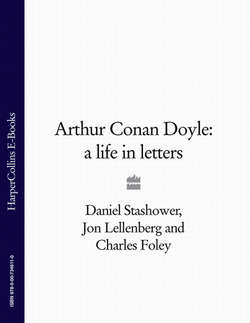Читать книгу Arthur Conan Doyle: A Life in Letters - Daniel Stashower, Исмаил Шихлы - Страница 86
to Mary Doyle STONYHURST
ОглавлениеI fear that we will come in so late that you will not be able to meet me conveniently. The train starts at four and comes in about ten I think. I am sorry to leave the old place after such a long residence, but I will be glad to get home again and see you all and Ida. Seven years continued routine becomes very monotonous eventually.
Tell Lottie and Cony I have a present for them. It is a lot of numbers of Cassell’s illustrated history of the war. The pictures ought to amuse them.
I wish Tottie was at home to see me, however I suppose she will come back before very long.
I get a prize for passing in Honours, which I will bring home carefully.
It was over, and he had done better than expected; certainly better than some of his schoolmasters had expected. Now he was done at Stonyhurst, with the good education for which Jesuits were famous, as Michael Conan had recommended. But he was never very sentimental about his school. ‘I don’t, looking back, consider the Stonyhurst system a good one,’ he later told Margaret Ryan, mother of his friend Jimmy Ryan, ‘nor would I send a son of mine there if I had one. They try to rule too much by fear—too little by love and reason.’
In his letters home Conan Doyle never touched upon one of the most important effects of his Jesuit education: his loss of faith in the Roman Catholic Church to which the Doyles were devoted. ‘Nothing can exceed the uncompromising bigotry of the Jesuit theology,’ he said in Memories and Adventures. ‘I remember that when, as a grown lad, I heard Father Murphy, a great fierce Irish priest, declare that there was sure damnation for everyone outside the Church, I looked upon him with horror, and to that moment I trace the first rift which has grown into such a chasm between me and those who were my guides.’
He did not write home about it. His mother might be someone whose advice (as he put it in his 1895 autobiographical novel The Stark Munro Letters) was ‘Wear flannel next your skin, my boy, and never believe in eternal punishment,’ but his father, said Conan Doyle in his memoir, ‘lived and died a fervent son of the Roman Catholic faith.’
Returning home, he found that the family’s circumstances had undergone more change. ‘My mother had adopted the device of sharing a large house,’ he said, ‘which may have eased her in some ways, but was disastrous in others.’ This comment, made nearly half a century later, was probably an oblique reference to one lodger in particular, Dr Bryan Charles Waller, who had already come to assume a powerful influence in the Doyle household. Only six years older than Conan Doyle, Waller would soon take over paying the family’s rent, usurping the role of the increasingly infirm Charles Doyle. Initially, young Conan Doyle warmed to Waller, who not only a notable physician but a published poet. But later his feelings would darken, perhaps over Waller playing a role that Conan Doyle would have liked to play instead. (And yet when he married in 1885, Waller acted as best man. Considerable speculation has been expended on Dr Waller’s relationship with the family, but too little data is available to reach firm conclusions.)
‘Perhaps it was good for me that the times were hard,’ he said. ‘[T]he situation called for energy and application, so that one was bound to try to meet it. My mother had been so splendid that we could not fail her.’ Edinburgh University had one of the best medical schools in the world, and that Dr Waller had trained there, and could help Conan Doyle prepare for the entry examinations, must also have had some bearing on the decision that he should study medicine too.
But Conan Doyle was still young for university at age sixteen. ‘I was dispatched, therefore, to Feldkirch, which is a Jesuit school in the Vorarlberg province of Austria, to which many better-class German boys are sent. Here the conditions were much more humane and I met with far more human kindness than at Stonyhurst, with the immediate result that I ceased to be a resentful young rebel and became a pillar of law and order.’
